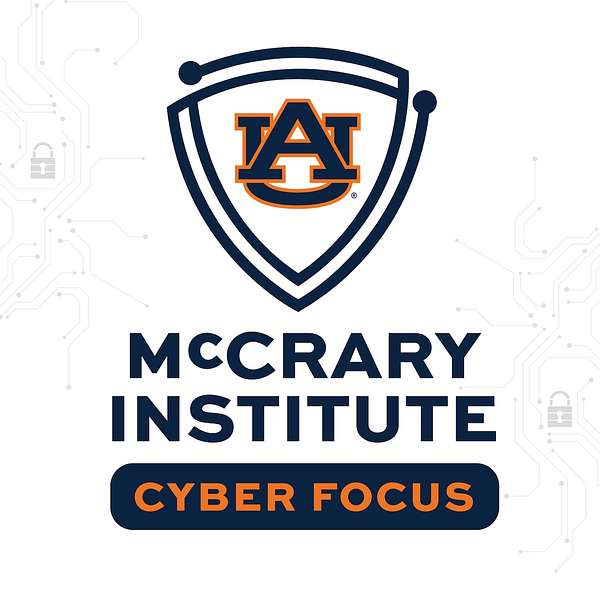
Integrating Intelligence: CTIIC’s Role in Defending Critical Infrastructure with Laura Galante and Lauren Goldman
Wed, 29 Jan 2025

AI, Ransomware, and Medical Devices: Safeguarding Healthcare with Errol Weiss
Wed, 22 Jan 2025

Priorities and Challenges for the Trump Administration with Matt Hayden and Mark Montgomery
Wed, 15 Jan 2025

Grid Resilience, Cyber Threats, and the Future of Energy Security with E-ISAC CEO Manny Cancel
Wed, 18 Dec 2024

AI, Infrastructure, and Regulation with Eric Geller
Wed, 11 Dec 2024

Bridging the Cybersecurity Gap: Congressman Mark Green on Workforce, Regulation, and Resilience
Wed, 04 Dec 2024

Driving the Future: Cybersecurity Challenges for Connected Vehicles with Cheri Caddy
Wed, 20 Nov 2024

Community-Level Cybersecurity and Workforce Diversity with Kiersten Todt
Wed, 13 Nov 2024

AI, Cybersecurity, and State Innovation: A Conversation with Nebraska's CISO Patrick Wright
Wed, 06 Nov 2024

Securing the Surface: TSA's Role in Pipeline and Transportation Security with Sonya Proctor
Wed, 30 Oct 2024

A Look Inside McCrary Institute's Presidential Transition Report
Wed, 23 Oct 2024

Cybersecurity Diplomacy and Technological Leadership with Australia's Toby Feakin
Wed, 16 Oct 2024

From DJI to SolarWinds: Navigating Supply Chain Risks and Building Resilience with Bob Kolasky
Wed, 09 Oct 2024

Signals Intelligence, Zero Trust, and the Next Generation Workforce with NSA's Dave Luber
Wed, 02 Oct 2024

Evolving Cyber Threats: Insights from Former CISA Executive Brandon Wales
Wed, 25 Sep 2024

Cyber Focus Brief: Unpacking the Lebanon Pager Attack’s Ripple Effect on Global Supply Chains
Fri, 20 Sep 2024

Navigating the Cyber Storm with NightDragon's Dave DeWalt and Katherine Gronberg
Wed, 18 Sep 2024

OT Under Threat: Dragos' Robert M. Lee on Navigating Cyber-Physical Risks
Wed, 11 Sep 2024

Transforming Cyber Defense: Zero Trust Strategies with Sean Connelly
Wed, 04 Sep 2024

Threat Horizons With Google Cloud's Charles DeBeck
Wed, 28 Aug 2024

Safeguarding Civil Nuclear Facilities From Cyber Threats with Chatham House's Dr. Marion Messmer.
Wed, 21 Aug 2024

North Korea's Cyber Operations with Mandiant's Michael Barnhart
Wed, 14 Aug 2024

Challenges for Cybersecurity and Future Legislation with John Katko
Wed, 07 Aug 2024

Post-Chevron Cyber Regulations with Ari Schwartz & Harley Geiger
Wed, 31 Jul 2024

Spyware and Cyber Regulation with Cyberscoop's Tim Starks
Wed, 24 Jul 2024

From Ransomware to Nation-State Attacks: Insights on Cyber Insurance with Matt McCabe
Wed, 17 Jul 2024

Public-Private Partnerships and the Future of Cyber Defense with Sue Gordon
Wed, 10 Jul 2024

Cyber Diplomacy in Action: The Tallinn Mechanism with Ambassador Tanel Sepp
Wed, 26 Jun 2024

Innovating at Speed: Advancing AI with Teresa Shea and Glenn Gaffney
Wed, 19 Jun 2024

Treasury’s Cyber Defenses and AI Future with Todd Conklin
Wed, 12 Jun 2024

Briefings to Action: Christopher Porter on Cyber Intelligence for Leaders
Wed, 05 Jun 2024

Minimizing Cyber Risks: Steve Kelly on Secure Strategies
Wed, 29 May 2024

Redefining Cybersecurity: Michael Daniel’s Vision for a Safer Digital Future
Wed, 22 May 2024

Cyber Focus at RSAC 2024: Google Cloud's Phil Venables
Wed, 15 May 2024

Cyber Focus at RSAC 2024: GDIT's Matt Hayden
Mon, 13 May 2024

Cyber Focus at RSAC 2024: Flashpoint CEO Josh Lefkowitz
Fri, 10 May 2024

Cyber Focus at RSAC 2024: Alison King & Elisa Costante
Thu, 09 May 2024

Building Blocks of Cyber with Anjana Rajan
Wed, 08 May 2024

Responding Effectively to Foreign Propaganda with Gavin Wilde
Wed, 01 May 2024

NIST's Cyber Framework 2.0 with Cheri Pascoe
Wed, 24 Apr 2024

Revealing Cyber News with Reuters' Chris Bing
Wed, 17 Apr 2024

Unraveling Cybersecurity's Key Challenges with Mark Montgomery
Wed, 10 Apr 2024

Responding to a Changing World with Yigal Unna
Wed, 03 Apr 2024

Countering Chinese Intelligence with Bill Evanina
Wed, 27 Mar 2024

Chris Krebs' View of the Cyber Landscape
Wed, 20 Mar 2024

Bringing the NSA Out of the Shadows with George Barnes
Wed, 13 Mar 2024

Broad Perspectives with Ellen Nakashima and Dmitri Alperovitch
Wed, 06 Mar 2024

How the Secret Service Battles Cybercrime with Mike D'Ambrosio
Wed, 28 Feb 2024

Tom Fanning's Vision for U.S. Cybersecurity
Wed, 21 Feb 2024

News Brief with Politico's Maggie Miller
Tue, 20 Feb 2024

Improving Cyber Policy with Melissa Hathaway
Wed, 14 Feb 2024

Covering the Cybersecurity Beat with CNN's Sean Lyngaas
Wed, 07 Feb 2024

The US Cyber Landscape with Chris Inglis
Wed, 31 Jan 2024

Cyber Focus Preview Introduction
Thu, 25 Jan 2024


